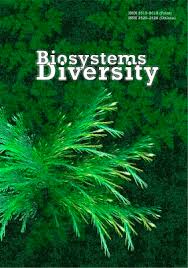Algal and cyanobacterial diversity in saline rivers of the Elton Lake Basin (Russia) studied via light microscopy and next-generation sequencing
Algal and cyanobacterial diversity in saline rivers of the Elton Lake Basin (Russia) studied via light microscopy and next-generation sequencing
Author(s): M.E. Ignatenko, E. A. Selivanova, Y.A. Khlopko, T.N. Yatsenko-StepanovaSubject(s): Energy and Environmental Studies, Sociobiology
Published by: Дніпропетровський національний університет імені Олеся Гончара
Keywords: microalgae; Cyanobacteria; saline rivers; Elton; light microscopy; next-generation sequencing;
Summary/Abstract: Naturally saline rivers are known in various regions of the world. Saline rivers with a salinity gradient from the source to the mouth are particularly interesting, because the range of salinity is the structure-forming factor of the hydrobiont assemblage. Such rivers are represented by saline rivers of the Elton Lake Basin in Volgograd region of Russia (the Bolshaya Samoroda River and the Malaya Samoroda River). Herein, we analyzed taxonomic structure and species diversity of microalgae and Cyanobacteria of the saline rivers flowing into the Elton Lake by light microscopy and next-generation sequencing. The differences and possible causes of inconsistencies in the results obtained by these methods are discussed. In total, 91 taxa of microorganisms were identified by integrated approach in the assemblages of microalgae and Cyanobacteria in the middle course of the Bolshaya Samoroda River, and 60 taxa – in the river mouth. The species diversity of those assemblages in the hypersaline Malaya Samoroda River was lower: 27 taxa from the middle course and 23 taxa from the mouth. Next-generation sequencing allowed us to refine and expand the list of microalgae taxa in the studied saline rivers due to detection of species which were hard to identify, low-abundance taxa, as well as extremely small-cell forms. Some discrepancies between the data obtained by light microscopy and next-generation sequencing indicate the advantage of simultaneous use of both methods for study of the algae communities. Such a comprehensive approach provides the most accurate and correct list of taxa added with the morphological descriptions and 18S rRNA and 16S rRNA partial sequences. Generally, 18 taxa have been recorded for the first time in the Bolshaya Samoroda River, belonging to the phyla Chlorophyta (Borodinellopsis sp., Chlorochytrium lemnae Cohn, Caespitella sp., Halochlorococcum sp., Tetraselmis cordiformis (H. J. Carter) F. Stein), Ochrophyta (Pseudocharaciopsis ovalis (Chodat) D. J. Hibberd, Characiopsis sp., Poterioochromonas stipitata Scherffel, Chrysolepidomonas sp.), Euglenozoa (Euglena bucharica I. Kisselev, Lepocinclis tripteris (Dujardin) B. Marin & Melkonian, Phacus orbicularis K. Hübner, P. parvulus G. A. Klebs), Cryptophyta (Hemiselmis cryptochromatica C. E. Lane & J. M. Archibald, Rhodomonas sp., Hanusia phi J. A. Deane), Haptophyta (Pavlova sp.), Cyanobacteria (Johanseninema constrictum (Szafer) Hasler, Dvorák & Poulícková). Seven taxa have been detected for the first time in the algal and cyanobacterial assemblages of the Malaya Samoroda River from the phyla Chlorophyta (Tetraselmis cordiformis, T. arnoldii (Proschkina-Lavrenko) R. E. Norris, Hori & Chihara, T. tetrathele (West) Butcher, Pyrobotrys elongatus Korshikov), Cryptophyta (Hanusia phi), and Cyanobacteria (Synechococcus elongatus (Nägeli) Nägeli, Oscillatoria simplicissima Gomont).
Journal: Biosystems Diversity
- Issue Year: 29/2021
- Issue No: 1
- Page Range: 59-66
- Page Count: 8
- Language: English

